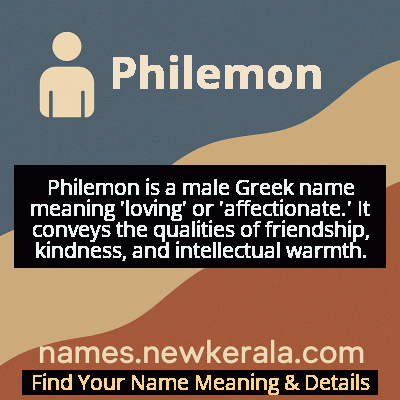Philemon Name Meaning & Details
Origin, Popularity, Numerology Analysis & Name Meaning of Philemon
Discover the origin, meaning, and cultural significance of the name PHILEMON. Delve into its historical roots and explore the lasting impact it has had on communities and traditions.
Name
Philemon
Gender
Male
Origin
Greek
Lucky Number
2
Meaning of the Name - Philemon
Philemon is a male Greek name meaning 'loving' or 'affectionate.' It conveys the qualities of friendship, kindness, and intellectual warmth.
Philemon - Complete Numerology Analysis
Your Numerology Number
Based on Pythagorean Numerology System
Ruling Planet
Moon
Positive Nature
Diplomatic, friendly, artistic, empathetic.
Negative Traits
Over-sensitive, moody, indecisive, prone to self-pity.
Lucky Colours
Green, cream, white.
Lucky Days
Monday.
Lucky Stones
Pearl, moonstone.
Harmony Numbers
1, 3, 4.
Best Suited Professions
Diplomats, mediators, caregivers, artists.
What People Like About You
Cooperative spirit, friendliness, artistic talent.
Famous People Named Philemon
Saint Philemon
Early Christian Saint
Mentioned in Paul's Epistle to Philemon in the New Testament as a Christian leader who hosted a house church
Philemon of Syracuse
Ancient Greek Poet
Renowned writer of New Comedy whose works influenced later Roman playwrights like Plautus and Terence
Philemon Holland
English Translator
Known as 'the translator general' for his English translations of major classical works including Livy, Pliny, and Plutarch
Philemon Wright
Pioneer and Founder
Founded Wright's Town, the first permanent settlement in Canada's National Capital Region (now Gatineau, Quebec)
Name Variations & International Equivalents
Click on blue names to explore their detailed meanings. Gray names with will be available soon.
Cultural & Historical Significance
Extended Personality Analysis
Individuals named Philemon are typically characterized by intellectual curiosity, deep loyalty in relationships, and a philosophical approach to life. They tend to be thoughtful, reflective personalities who value meaningful conversations and intellectual pursuits over superficial interactions. Their natural inclination toward friendship and community often makes them excellent mediators and trusted confidants. Philemons typically exhibit strong moral principles and a sense of responsibility toward others, combined with a gentle but persistent nature. They are often drawn to learning, teaching, or creative expression, finding fulfillment in sharing knowledge and fostering understanding. While they may appear reserved initially, they form deep, lasting bonds with those who share their values and intellectual interests. Their combination of emotional warmth and intellectual depth makes them both compassionate friends and wise advisors, often serving as pillars of their communities through quiet leadership and genuine concern for others' wellbeing.
Modern Usage & Popularity
Philemon remains a rare but distinguished choice in modern naming, primarily used by parents seeking classical, intellectual, or religious names with historical depth. While never achieving widespread popularity, it maintains steady usage among educated families, particularly those with Greek heritage or classical interests. The name appears occasionally in academic, artistic, and religious communities where its historical and literary associations are valued. In recent decades, Philemon has seen slight increases in usage as part of the trend toward reviving ancient names, though it remains outside the top 1000 names in most English-speaking countries. Its rarity contributes to its appeal for parents seeking unique yet meaningful names with substantial cultural heritage, often chosen by those who appreciate its blend of classical dignity, biblical significance, and intellectual connotations.
Symbolic & Spiritual Meanings
Symbolically, Philemon represents the union of intellectual pursuit and emotional connection, embodying the ideal of friendship rooted in shared wisdom and mutual respect. The name carries connotations of spiritual guidance, forgiveness, and reconciliation through its biblical associations, particularly the story of Philemon and Onesimus which symbolizes the transformation of social relationships through Christian love. In psychological symbolism, particularly in Jungian analysis, Philemon represents the wise old man archetype - a figure of profound insight who bridges conscious and unconscious knowledge. The name also symbolizes hospitality and community building, reflecting the historical Philemon's role as a host to early Christian gatherings. As a symbolic bridge between classical learning and Christian values, Philemon represents the integration of different wisdom traditions and the transformative power of educated compassion, making it a name that embodies both ancient wisdom and eternal human virtues.

